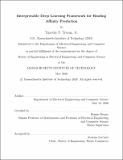Interpretable deep learning framework for binding affinity prediction
Author(s)
Truong, Timothy F.,Jr.
Download1193030777-MIT.pdf (26.30Mb)
Other Contributors
Massachusetts Institute of Technology. Department of Electrical Engineering and Computer Science.
Advisor
Bonnie Berger.
Terms of use
Metadata
Show full item recordAbstract
The increasing cost of drug development, now at more than a billion dollars per successful drug, has driven the need for computational methods for identifying compounds that bind to protein targets with high affinity. Here, we present a novel interpretable deep learning model for binding affinity prediction. The model combines recently developed learned protein sequence embeddings that encode structural information with compound fingerprints using a Transformer architecture. The predicted binding affinity is computed as a sum of potentials, where each potential conceptually represents the affinity of a residue of the protein to the compound. To encourage the model to predict high potentials for residues in contact with the compound, the model is additionally trained to predict ligand binding residues. Experiments show that the model outperforms DeepAffinity, a state of the art model for binding affinity prediction, and is highly interpretable. Unlike DeepAnity, whose interpretability was demonstrated for only a select few protein-compound pairs, we demonstrate the interpretability of our model for hundreds of protein-compound pairs, and quantify the degree of interpretability. Furthermore, we show that a variation of the ligand binding residue prediction model that is augmented with features from template based ligand binding prediction methods outperforms existing methods for the same task, and discovers novel binding pockets not found by those methods. These results indicate that the models presented will be useful for advancing progress in a variety of drug discovery related tasks.
Description
Thesis: M. Eng., Massachusetts Institute of Technology, Department of Electrical Engineering and Computer Science, May, 2020 Cataloged from the official PDF of thesis. Includes bibliographical references (pages 71-76).
Date issued
2020Department
Massachusetts Institute of Technology. Department of Electrical Engineering and Computer SciencePublisher
Massachusetts Institute of Technology
Keywords
Electrical Engineering and Computer Science.